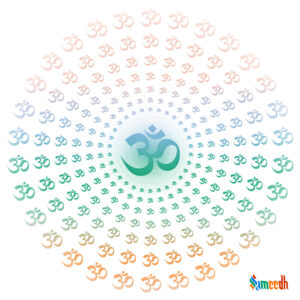Advait Vedanta, often simply referred to as Advait, is one of the principal schools of Vedanta philosophy within Hinduism. It emphasizes the importance of spiritual practice and knowledge in achieving liberation or moksh.

“Advait” translates to “non-dual” or “not two,” and Advait Vedanta emphasizes the ultimate oneness or unity of the individual soul (Atman) and the Supreme Reality (Brahman). It is one of the prominent schools of Vedanta. It has had a significant impact on Hindu philosophy, spirituality, and culture, and its teachings continue to be studied and practiced around the world today. The practice of self-inquiry, or “neti-neti” (not this, not that), is a key method for realizing the non-dual nature of reality. This involves questioning and negating all aspects of experience that are not the true self or Brahman. Some of the most famous teachers and proponents of Advait Vedanta include Adi Shankara, who is considered the founder of the school, and Ramana Maharshi, who taught a form of self-inquiry known as “Who am I?”
Key principles of Advait Vedanta include:
- Non-dualism (Advait): Advait Vedanta posits the ultimate reality, Brahman, as non-dual (advait). This means that Brahman is without any second entity or principle. According to Advait, there is only one ultimate reality, and everything else is an illusion or manifestation of Brahman.
- Brahman: Brahman is the absolute reality, which transcends all attributes, forms, and distinctions. It is pure consciousness, existence, and bliss (sat-chit-ananda). Advait holds that Brahman is the substratum of the entire universe and the essence of the individual self (Atman).
- Atman (Individual Self): Advait Vedanta teaches that the individual self (Atman) is not different from Brahman. Each individual soul is ultimately identical with the supreme reality. The perceived differences between individual selves are due to ignorance (avidya) or illusion (maya).
- Maya (Illusion): Maya is the principle of illusion or cosmic ignorance that veils the true nature of reality. It creates the appearance of duality and plurality in the world, leading individuals to perceive themselves as separate from Brahman and from each other.
- Three Levels of Reality: Advaita Vedanta delineates three levels of reality, known as “trika,” which are:
- Paramarthika Satyam (Absolute Reality): This is the highest level of reality, which refers to the ultimate oneness of Brahman. It is the only truly real and permanent existence.
- Vyavaharika Satyam (Transactional Reality): This level of reality pertains to the empirical world of everyday experience, characterized by the perception of diversity and individuality. While it is valid on the conventional level, it is considered ultimately unreal from the standpoint of absolute truth.
- Pratibhasika Satyam (Apparent Reality): This level of reality refers to subjective experiences such as dreams or hallucinations, which are considered illusory and unreal.
- Scriptural Authority: Advaita Vedanta derives its philosophical framework from the Upanishads, particularly those known as the “Vedanta” or “end of the Vedas,” which expound upon the nature of the ultimate reality. Adi Shankaracharya’s commentaries on these texts, particularly his works known as the Prasthanatrayi Bhashyas, are foundational for understanding Advaita philosophy. Advait Vedanta regards the Upanishads, the Bhagavad Gita, and the Brahma Sutras, elucidating Advaita Vedanta teachings.
- Jnana (Knowledge): Advait Vedanta emphasizes the importance of spiritual knowledge (jnana) in realizing one’s true nature as Brahman. This knowledge arises through the study of scriptures, reflection, and direct realization (anubhav) of one’s essential identity with Brahman.
- Moksh (Liberation): Liberation (moksh) in Advait Vedanta is the realization of one’s non-dual nature with Brahman. It involves transcending the cycle of birth and death (samsar) and attaining spiritual freedom from the limitations of individual existence.
Advaita Vedanta has had a profound influence on Hindu thought and spirituality, as well as on broader Indian philosophical discourse. Its teachings continue to inspire seekers of truth and liberation, emphasizing the unity of all existence and the transcendence of dualistic distinctions.